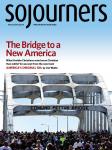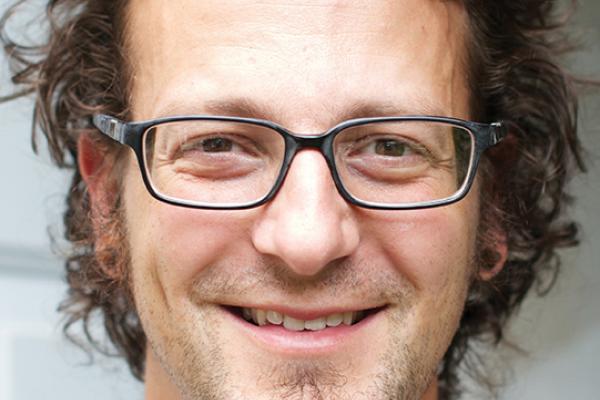A SELF-PROCLAIMED “ordinary radical” from eastern Tennessee, Shane Claiborne is a founding member of the New Monasticism movement, which encourages a life of simplicity, nonviolence, community, and prayer. In 1997, along with fellow passionate friends from Eastern University, Shane co-founded The Simple Way—an intentional Christian community in inner-city North Philadelphia. His books include Jesus for President, Red Letter Revolution, Common Prayer, and Becoming the Answer to Our Prayers. He’s been featured in films such as Another World is Possible and Ordinary Radicals.
His forthcoming book, Executing Grace, calls Christians to advocate for the abolishment of the death penalty.
Shane’s first book, The Irresistible Revolution: Living as an Ordinary Radical, quickly became a foundational text for many young, social justice-minded Christians. Now, 10 years later, he’s updating the world about what this revolution looks like today. Claiborne spoke with Sojourners editor-in-chief Jim Wallis by phone in November about what’s new—and what’s not—in his lifelong vocation to be part of the Jesus revolution.
Jim Wallis: This is the 10th anniversary of the publication of Irresistible Revolution, and you’ve just released an updated edition. What new insights can we expect in this version?
Shane Claiborne: After 20 years of living in North Philly, there are things you look back on and you think, wow, that looks different from what I thought it would. So it’s been a surprise and a gift to get to tweak the book a little bit. I wrote notes in the margins throughout the book. Some of them are fun and some of them are to be a little bit more accurate. Then I did a whole section of frequently asked questions. Those run the gambit of “How come you got married?” to “What do you do with ISIS?” I added an appendix, too, about the tradition of civil disobedience in the church. It was fun!
“The irresistible revolution,” you said in the first edition of the book, “isn’t just about going to heaven when you die, but bringing heaven down as you live. ...The revolution we are talking about begins inside each of us and extends to the ends of the earth.” Has that changed? No, I don’t think that has changed at all. What does change are the ways we live that out. When we started The Simple Way 20 years ago, there was the sense that everybody needs to leave everything behind and just live on the streets. What we’ve seen the Spirit doing is much more dynamic and spectacular than that—people are living out unique vocations. We have lawyers, doctors, plumbers, gardeners, or urban farmers—folks who are using their gifts for seeking first the kingdom of God and interrupting the patterns of injustice.
We are called to “not conform to the patterns of the world.” But nonconformity doesn’t mean uniformity. It doesn’t mean we’re all going to do the same thing. I’m really grateful for that. I tell a lot of those new stories of what we’ve seen happen over the last 10 years in the new edition.
How have your thoughts changed about Christian community? The Simple Way looks different now from the way it did 20 years ago. We moved in with a bunch of wild 20-year-olds into a row house, and that was beautiful when we were 20. Now we have a dozen houses on the same block, and we’ve got a little bit of elbow room. The exact form of community looks different, but I think the spirit is still the same.
We don’t want to be a community in the neighborhood; we want to be a community with the neighborhood. And we’ve been building that together. So now almost all the programs here at The Simple Way are run by people who have been here longer than I have. They’re indigenous folks from the neighborhood. The ones giving out food bags are people who received food bags. The young people who are leading some of our educational stuff are kids who grew up on the block and now are graduating from schools such as Eastern University.
I sometimes say that we set out to start a community and now we have a village. And, really, we do. We’ve got community gardens everywhere, and murals. That’s one of the things we’ve seen after 20 years in this neighborhood: We have real, authentic friendships, where we’re not just giving out food. I have neighbors that invite me over almost every night for dinner, and we’ve got so much happening now that we’re building it together. There’s a lot of pride in the neighborhood.
You also got married. How has that changed your life in community? The great thing is we get to do Jesus’ work with our best friends. It’s funny: Sometimes people think that [getting married] caused me to compromise a lot of my radical ideas. But one of the first things my wife, Katie, said to me was, “We make too much money—we’ve got to simplify.” And Katie doesn’t believe in television; I’ve never had a TV. She also doesn’t believe in air conditioning or microwaves. So I had to simplify even further. We have a blast! I’m delighted to have found someone who has the same commitments I do and maybe even more radical ones, in some ways.
You have a new book coming out this spring on the death penalty. It’s got a great title: Executing Grace. Working against the death penalty means organizing, mobilizing, and trying to save real people’s lives in real time, but also changing policy and laws. How have your thoughts evolved over time on how Christians need to confront and engage politics to make changes? Part of what I’ve realized is that engaging politically is a part of what it means to love our neighbor as ourselves. “Political” has the same root as polis—you know, like “Indianapolis.” It’s about how we live together as people.
Cornel West is right when he says that “justice is what love looks like in public.” I think we can have policies that create barriers to compassion and to love. Or we can create policies that stand on the side of life, as we think about things such as gun violence and other major issues. Just as slavery was a political issue, it was also a social and moral issue. But slavery is not the only one. Many of these other things that we love to talk about are spiritual issues as well. We can’t be engaged politically from a distance. With some policy makers, part of the problem is that they have no proximity to suffering. They’ve grown away from the people most affected by the policies.
We have to make sure that politics is personal. To love our neighbor as ourselves also causes us to care about the machinery of death and the systems and the principalities that are robbing them of their dignity or holding them hostage.
For years you were known for your dreads. Why no more dreadlocks? Well, I probably needed a haircut—I’ve had like two haircuts in the last 20 years. But the real story is I went to Afghanistan. I got to visit these wonderful young people through Friends Without Borders and the Afghan Peace Volunteers. When I was going to Afghanistan, they said, We recommend that you cut your hair. I said, Because I’ll stand out and everybody will know I’m a foreigner from the U.S.? They said, No, we’re actually more concerned that they will think you’re with al Qaeda. I said, Let’s get the scissors. So I got a little trim.
Irresistible Revolution became a life-changing book for a generation of people. How have you dealt with the attention it has brought you? Community keeps you pretty grounded. Even the decision to write the book was a decision I made with my community. One of the things we decided was to give away all the proceeds from that book.
I also discern with my community and my wife about how much I travel. One time, Harvard had a speaker cancel, and they called to invite me to speak. My travel days were full. I brought it before the committee that works with me on that, and they said, Your travel days are full. I said, This is Harvard! And they said, Harvard will be there next year. So I said no to that invitation. That was a decision I might not have been able to make on my own.
I’ve written every book after my first one with someone else. What we do is use our voice to amplify others. The death penalty book really is about amplifying the voices of the murder victims’ families that are against execution and the voices of folks who’ve been wrongfully convicted.
How do you combat cynicism and retain your joy? How do you keep hope at the center of things? We have to remember that we’re not asking God to be on our side; we’re trying to be on God’s side. We trust that there’s an overt hand in all this that’s bigger than our own. We’re activists at heart.
A few years into all this, we did a book called Common Prayer, where we built on the different ways that people have prayed in different traditions; we included songs of freedom movements and spirituals and hymns.
We really had to revitalize our own prayer life. We had to learn to pray again and connect our prayer with action, so that it’s not an excuse for inaction. Prayer fuels our ability to believe that things can be different.
Community also gives me courage. We don’t bear the burdens on our own, but we carry them together. Community is about creating a critical mass, just like coals of a fire keep the fire alive. You put a fire out by spreading the coals out; you keep the fire alive by putting it together. We keep fanning each other’s flame of hope. I live with hopeful people. I live with imaginative people. I live with folks who play a lot of pranks and have a lot of fun. I like the paraphrase from Emma Goldman: If I can’t dance, it’s not my revolution. That’s part of what we do for each other.
I hope we’ll continue to heal the wounds of racial injustice and look back and smile at the things we’ve accomplished. I’m thankful for all of those folks who have come before, and I’m inspired by a new generation of folks. I just hit 40 this year. I remember when my dad turned 40; it felt to me like he was ancient. It’s amazing to see a new group of young folks who are coming up and are taking things even further than we have.

Got something to say about what you're reading? We value your feedback!


